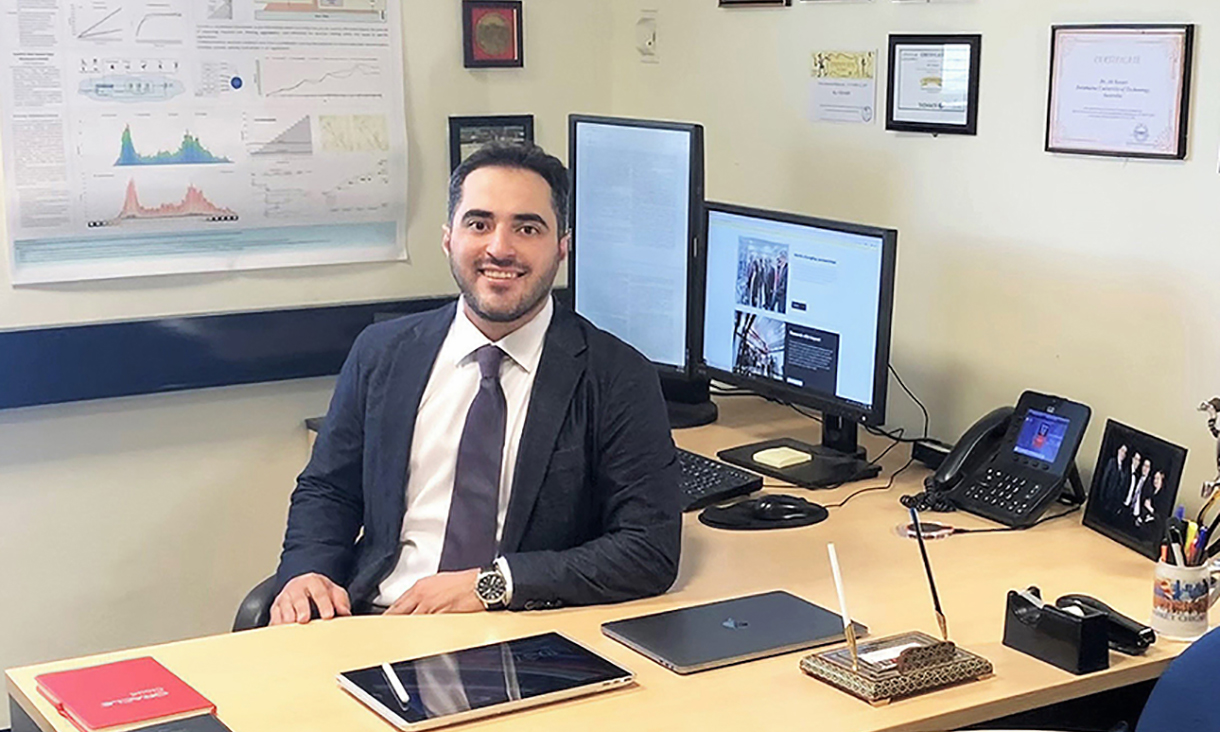Victoria Fellowship for Swinburne’s Dr Ali Yavari

Dr Ali Yavari has been an important contributor in the success of Swinburne’s Internet of Things Lab and Manufacturing Futures Research Institute.
In summary
- Dr Ali Yavari has been awarded a prestigious Victoria Fellowship to explore opportunities for the Internet of Things (IoT)
- Dr Yavari is a highly innovative researcher, and has also taught specifically designed units of the new IoT major in Swinburne’s Bachelor of Computer Science
Swinburne University of Technology researcher Dr Ali Yavari has been awarded a prestigious Victoria Fellowship to explore opportunities for the Internet of Things (IoT).
IoT is the Internet evolution that includes sensors, cameras, industrial machines, vehicles and other devices as well as related communication and data analytics technologies that permit such “things” to self-organise, exchange observations, make intelligent decision and provide needed solutions to our society.
Dr Yavari is one of six Victorian scientists awarded a prestigious Victoria Fellowship in Physical Sciences announced on 25 November by the Minister for Innovation, Medical Research and the Digital Economy, the Honourable Jaala Pulford.
The Victoria Fellowship will support Dr Yavari to undertake overseas visits and study missions to assist in developing a commercial idea, undertake specialist training, or career development.
“The main aim of this fellowship is to establish strong international collaborations towards the development of techniques and solutions that focus on human and IoT interactions,” Dr Yavari says.
“These range from developing wearable IoT devices and related data analysis that enhance work and social activities to discovering and integrating openly available sensors and IoT devices to solve social and health problems of national importance.
“For example, monitoring and providing information at the right place and time to prevent COVID-19 transmission via assessing social gatherings and symptoms at large scale.”

Dr Yavari has been an important contributor to the success of Swinburne’s Internet of Things Lab and Manufacturing Futures Research Institute since joining Swinburne in 2017.
He is a highly innovative researcher, and in the past few years has also taught specifically designed units of the new IoT major in Swinburne’s Bachelor of Computer Science.
Victoria Fellowships
The Victoria Fellowships, each worth $18,000, recognise young researchers with leadership potential to enhance their future careers, while developing new ideas that could offer commercial benefit to Victoria.Dr Yavari received his Master of Science degree in Communication Systems from KTH Royal Institute of Technology, Sweden. He obtained his PhD from the School of Computer Science and Information Technology at Royal Melbourne Institute of Technology, Australia.
Dr Denver Linklater, who recently completed her PhD at Swinburne has also been awarded a Victoria Fellowship in Life Sciences.
-
Media Enquiries
Related articles
-

- Technology
- Science
- Engineering
Victorian students drive green energy transition through international hydrogen competition
Swinburne’s KIOSC, in collaboration with Horizon Educational and Gippsland Tech School, co-hosted the Hydrogen Grand Prix in Melbourne.Friday 26 July 2024 -

- Technology
- Health
New MedTechVic prototypes to transform everyday lives of people with a disability
Swinburne’s MedTechVic has revealed three new prototypes designed through the joint Health-led Manufacturing Innovation Program, in partnership with the Australian Medtech Manufacturing Centre and Safer Care Victoria
Friday 19 July 2024 -

- Business
- Technology
Swinburne’s Luminate Pitch Night 2024 advances innovative ideas for a better world
Swinburne’s 2024 Luminate Pitch Night showcased market-ready ideas from 10 founders
Wednesday 12 June 2024 -

- Health
- Technology
Clinical Innovation Fellowships develop creative solutions to Australia’s healthcare challenges
MedTechVic is gearing up to begin its fourth year of the Clinical Innovation Fellowship Program (CIFP), following the highly successful third round in 2023.
Wednesday 19 June 2024 -

- Technology
- Aviation
- Sustainability
Swinburne partners with Latrobe City Council to propel Victoria’s Advanced Air Mobility precinct
Swinburne has become the first Foundation Member of the newly established Latrobe Aerospace Technology Precinct.
Friday 03 May 2024

